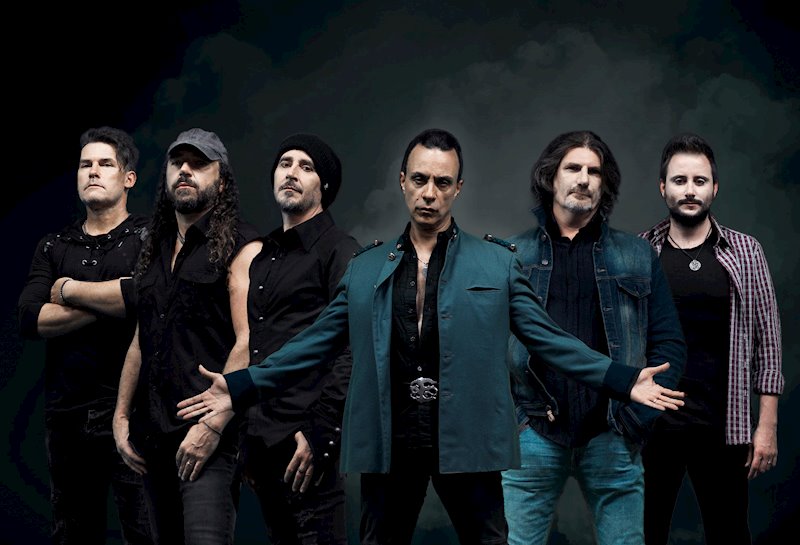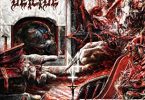Heavyworlds is excited to sit down with Roberto Tiranti, the talented frontman of the iconic Italian progressive metal band Labyrinth. As the band prepares for the release of their highly anticipated new album, “In The Vanishing Echoes of Goodbye“, Roberto takes us behind the scenes to discuss the creative journey, the evolution of Labyrinth’s sound, and the deeply personal themes explored in the album. From his reflections on the band’s musical path to his thoughts on the current state of the world, this interview offers an exclusive glimpse into the mind of one of metal’s most respected vocalists.
Scroll down for the italian version
[ENG]
- Hi Roberto, welcome to Heavyworlds! How are things going?
Hey Giuseppe! …I’d say everything’s going relatively well despite the far from peaceful times we’re living in.
- In your new album, “In The Vanishing Echoes of Goodbye“, we find many tracks that seamlessly blend power and prog metal. How does the creative process that led to this fusion come about, and which elements of both genres do you aim to keep alive in your compositions?
Our creative process is entirely free of preconceived ideas or set directions, and that’s why Labyrinth has often taken different paths, as the music itself has led us elsewhere. I’ll give you an example: “Freeman”. In this case, we simply locked ourselves in the rehearsal room, understanding step by step where the natural “playing together” would take us. We consider this album the right conclusion to a trilogy that began with “Architecture of a God”.
- Themes of loss and change permeate the album, but they’re not just personal reflections. How do these concepts integrate into your musical vision, and how do you think they might inspire reflection in the listener?
I don’t have the presumption of wanting to make the average listener reflect, but of course, if that happened, I’d be very happy. I like to write lyrics inspired by two elements: the world around me and the music I have to write lyrics and melodies for. Naturally, my point of view comes through in the lyrics, and that’s entirely subjective.
- Each track on the album seems to tell a unique story, but without breaking the overall flow of the album. How do you build this narrative without losing sight of the unity of the message you want to convey?
Again, there’s no “premeditation” or any sort of recipe. The music, in its coherence, suggests the themes to explore in each song.
- For tracks like “The Son I Never Had”, the vocals aren’t just technical, they become a powerful emotional tool. How does your vocal expression evolve on this album compared to previous works?
This is indeed a rather intimate and personal song. It’s a theme that’s been explored by various bands and soloists who, like me, couldn’t or didn’t want to have children. Naturally, when addressing such delicate topics, emotional aspects must come before technical ones.
- Which track on the album do you think best represents the artistic direction you’ve taken?
I believe the singles we’ve chosen — “Welcome Twilight,” “Out of Place,” and “The Right Side of This World” — are the best possible introduction to the album. Also, “The Healing” would be a great example, with many melodic and prog elements at the same time.
- The production process seems to have required particular attention to detail. How do you approach the recording phase and the search for the ideal sound?
As I mentioned earlier, everything started very organically in the rehearsal room. Music must be shared and played together, otherwise, it doesn’t make sense. Then, we entrusted our sound to the skilled hands and ears of our friend Simone Mularoni, who’s been taking care of our sound since 2016. We have full trust in him, and working with him is a real pleasure and inspiration.
- As the tenth album of your career, “In The Vanishing Echoes of Goodbye” marks a milestone. Looking back on your journey as a band, which moment or album do you think defined your identity?
It’s not obvious, although it might seem so, to place “Return to Heaven Denied” at the top. In this new work, you can find many elements from that period, but of course, we’re no longer in our twenties. As a result, the sound follows the passage of time and all the experiences, both good and bad, that have led us to 2025.
- Within the context of the album, how do you balance the theme of disorientation with hope or the search for meaning? Does the music become an attempt to answer these questions, or a way to keep asking them?
Thanks for these questions. It’s clear you’ve really taken the time to dig into the lyrics. I’m not naturally pessimistic, but that doesn’t make me indifferent or complacent. I see what’s happening in the world and speak about it in my songs, sometimes changing my mind, because, yes, unyielding consistency often equals stubbornness. For example, what happened during the COVID period, and how I’ve adjusted certain stances, is discussed in the first single “Welcome Twilight.”
For me, it’s important to leave the listener with the message that we’re probably not yet at the point of no return and that the change must come from us. Music must offer comfort, even when addressing difficult themes.
- Your compositions are always complex but never lose their emotional power. How do you avoid technical virtuosity from overshadowing the emotional aspect? Is it a balance you’ve found over time, or is it a continuous challenge?
The metal we grew up with revolves around great melodies, energy, and the right dose of virtuosity. I don’t think we could do it any other way than we’ve been doing for nearly thirty years. I believe those elements are embedded in our musical DNA.
- With such complex musical arrangements, how do you ensure that each element of the composition blends harmoniously without ever becoming chaotic? How do you decide when a track is ‘complete’ and doesn’t need further adjustments?
Again, we don’t have any special recipes. Each of us knows clearly what to do and how to do it in the overall structure of a song. We’ve never had issues with egos, like someone needing to add more notes or the lead singer always needing to be in the spotlight. The singer is just an instrument; of course, they sometimes have more responsibility because they’re “in front,” but that doesn’t create privileges — if anything, it adds burdens.
- Over the years, what specific challenges have you faced as a band, both personally and professionally? How have these experiences influenced your music and artistic evolution?
It would take 100 pages to talk about it. We are the sum of our mistakes and sometimes the absurd and wrong management by those who were in charge during crucial moments, getting practically everything wrong on our backs, but not theirs. We prefer to focus on what’s happening today, avoiding unnecessary regrets, knowing that we’ve achieved much more than we dreamed of as young guys with our first bands in the basement. Of course, all those experiences reverberate in our music and the way we write and perform it.
- In an era where music often becomes a tool for protest or change, what role do you see for yourselves in today’s music scene? How do your ideals and personal beliefs intertwine with the music you create?
Do we have a role? You know, I’m not sure we do. Perhaps we’ve never really aimed for one. We base everything on the genuineness of our ideas, regardless of what “someone” may say about us, especially over the past few years, when they’ve tried to tarnish and defame our lives (particularly mine) with preconceived notions, without knowing ANYTHING… but that’s a whole different story.
- Looking to the future of Labyrinth, what new musical directions or themes would you like to explore? Do you see yourselves expanding the boundaries of your sound even further, or would you prefer to stay true to what’s already brought you great satisfaction?
I don’t have the faintest idea! We’d love to bring our music to as many people as possible, both those who have supported us for many years in Italy and abroad. We really enjoy meeting the people who’ve been with us for so long, and for us, that’s what matters most. The rest counts for little in a historical moment when live music isn’t doing so well, both here and elsewhere, but perhaps even worse here than in other countries.
- Thank you for your time, it’s been a pleasure having you here with us. Is there anything else you’d like to say to our readers and your fans?
Thank you for the wonderful questions, and a big hug to all the readers and fans.

[ITA]
- Ciao Roberto, benvenuto su Heavyworlds, come vanno le cose?
Ciao Giuseppe! …direi che tutto va mediamente per il verso giusto nonostante i tempi tutt’altro che sereni in corso.
- Nel vostro nuovo album, “In The Vanishing Echoes of Goodbye” troviamo molti brani che mescolano fluidamente power e prog metal. Come nasce il processo creativo che ha portato a questa fusione, e quali elementi di entrambi i generi cercate di mantenere vivi nelle vostre composizioni?
Il nostro processo creativo è del tutto privo di preconcetti o direzioni studiate a tavolino, ed è il motivo per cui i Labyrinth hanno spesso preso altre strade poiché in quel momento è la musica stesso che ci ha portato altrove, cito per esempio “Freeman”. Anche in questo caso, non abbiamo fatto altro che chiuderci in sala prove, capendo di volta in volta, dove ci avrebbe portato il semplice e naturale “suonare insieme”. Quest’album lo riteniamo la giusta chiusura di un trittico cominciato con “Architecture of a God”.
- Le tematiche di perdita e cambiamento permeano l’album, ma non si limitano a essere semplicemente riflessioni personali. In che modo questi concetti si integrano nella vostra visione musicale, e come credete che possano far riflettere l’ascoltatore?
Non ho la presunzione di voler far riflettere l’ascoltatore medio della nostra musica, ma di certo se accadesse, ne sarei felicissimo. Mi piace scrivere testi stimolato da due elementi, ossia Il mondo che mi circonda e la musica su cui devo scrivere testi e melodie ed ovviamente da tutto ciò può trasparire un mio punto di vista, che in quanto tale è del tutto soggettivo.
- Ogni traccia dell’album sembra raccontare una storia unica, ma senza mai spezzare il filo conduttore dell’album. Come riuscite a costruire questa narrazione senza perdere di vista complessivamente l’unità del messaggio che volete trasmettere?
Anche in questo caso, non esiste una “premeditazione” o una qualsivoglia ricetta. La musica nella sua omogeneità suggerisce i temi da approfondire in ogni canzone.
- Per brani come “The Son I Never Had”, la voce non è solo tecnica, ma diventa un potente strumento emotivo. Come evolve la vostra espressione vocale in questo album rispetto ai lavori precedenti?
Questo in effetti è un brano piuttosto intimo e personale, ovviamente è un tema approfondito da svariate band e solisti che come me non hanno potuto o voluto avere figli. Va da sè che debbano arrivare prima aspetti emotivi piuttosto che tecnici se si toccano corde così delicate.
- Quale traccia, tra quelle di questo album, è quella che pensate rappresenti di più la direzione artistica che avete intrapreso?
Credo che i singoli scelti, “Welcome Twilight”, “Out of Place” e “The Right Side of This World”, siano il miglior biglietto da visita possibile per spiegare un intero album in tre brani, aggiungi che anche “The Healing” sarebbe un ottimo esempio, con molti elementi melodici e prog allo stesso tempo.
- Il processo di produzione sembra aver richiesto una particolare cura per i dettagli. Come vi approcciate alla fase di registrazione e alla ricerca di un sound ideale?
Come dicevo prima, tutto è nato in maniera molto organica in sala prove, la musica va condivisa e suonata insieme altrimenti ha davvero poco senso. Successivamente ci siamo affidati alle sapienti mani e orecchie del nostro amico Simone Mularoni che dal 2016 cura il nostro sound. Abbiamo piena fiducia e lavorare con lui è davvero molto bello e stimolante .
- Essendo il decimo album della vostra carriera, “In The Vanishing Echoes of Goodbye” segna una pietra miliare. Guardando indietro al vostro passato come band, quale pensate sia stato il momento, o anche l’album che ha definito la vostra identità?
Non è scontato, anche se lo sembra, mettere “Return to Heaven Denied” al primo posto, ed in questo nuovo lavoro si possono trovare molti ingredienti risalenti a quel periodo ma ovviamente non siamo più dei ventenni e di conseguenza il sound segue il tempo che passa e tutte quelle esperienze che nel bene e nel male ci hanno portati al 2025.
- Nel contesto dell’album, come riuscite a bilanciare il messaggio di disorientamento con la speranza o la ricerca di un senso? La musica diventa per voi un tentativo di rispondere a queste domande o un modo per continuare a porle?
Grazie per queste domande da parte di chi come te, si è davvero preso la briga di approfondire l’ascolto, leggendo i testi anche tra le righe. Non sono pessimista per natura ma questo non fa di me un ignavo/qualunquista, vedo cosa accade nel mondo e ne parlo nelle mie canzoni cambiando anche idea a volte poiché certo, che la coerenza ad oltranza sia sinonimo di ottusità. Mi riferisco per esempio a quanto accaduto nel periodo covid e quanto oggi io abbia ridimensionato certe prese di posizione parlandone nel primo singolo “Welcome Twilight”. Per me è importante lasciare l’ascoltatore col messaggio che probabilmente non siamo ancora al punto di non ritorno e la differenza dobbiamo farla noi.
La musica deve dare conforto anche quando approfondisce temi duri.
- Le vostre composizioni sono sempre complesse, ma non perdono mai la loro potenza emotiva. Come riuscite a evitare che i virtuosismi tecnici prevalgano sull’emotività? È un equilibrio che avete trovato nel tempo o una continua sfida?
Il metal, quello con cui siamo cresciuti, ha al centro di tutto grandi melodie, energia e la giusta dose di virtuosismo. Non credo sapremmo fare diversamente da come facciamo da circa trent’anni, credo siano elementi insiti nel nostro dna musicale.
- Con arrangiamenti musicali così complessi, come fate a garantire che ogni elemento della composizione si fonda armoniosamente senza mai risultare caotico? Come decidete quando un brano è ‘completo’ e non ha bisogno di ulteriori aggiustamenti?
Anche in questo caso non abbiamo ricette particolari, ognuno di noi ha ben chiaro quello che deve fare e come deve farlo nell’economia generale di un brano. Non abbiamo mai avuto problemi di ego per cui tizio deve fare tot note in più o il sottoscritto deve avere sempre l’occhio di bue su di sè. Il cantante è strumento, ovviamente a volte ha qualche responsabilità in più poiché “davanti” ma tutto ciò non genera privilegi, semmai oneri.
- In questi anni di carriera, quali sfide specifiche avete affrontato come band, sia a livello personale che professionale? E come queste esperienze hanno influenzato la vostra musica e la vostra evoluzione artistica?
Non basterebbero 100 pagine per parlarne, noi siamo la somma di nostri errori e a volte di gestione assurda e sbagliata da parte di chi ci ha gestito in alcuni cruciali momenti, sbagliando pressoché TUTTO sulla nostra pelle però, non la loro. Di fatto preferiamo pensare a quanto accade oggi evitando inutili rimpianti, consci che abbiamo avuto comunque molto più di quanto sognassimo da ragazzini con i primi gruppetti in cantina. Certo è che tutte le cosmesi cui sopra, riverberano nella nostra musica, nel modo di scriverla ed eseguirla.
- In un’epoca in cui la musica spesso si fa strumento di protesta o di cambiamento, quale ruolo vedete per voi stessi nel panorama musicale di oggi? In che modo i vostri ideali e le convinzioni personali si intrecciano con la musica che componete?
Abbiamo qualche ruolo? Sai che non so se ne abbiamo uno ? Forse non abbiamo mai davvero ambito ad averne. Basiamo tutto sulla genuinità delle nostre idee checchè ne dica “qualcuno” che da qualche anno vive per sporcare ed infamare le nostre esistenze (soprattutto la mia) con idee preconcette senza davvero sapere NULLA…ma questa in effetti è un altra storia.
- Guardando al futuro dei Labyrinth, quali nuove direzioni musicali e tematiche vi piacerebbe esplorare? Vi vedete espandere i confini del vostro suono ancora di più o preferite restare fedeli a ciò che vi ha già dato grandi soddisfazioni?
Non ne ho/abbiamo la benché minima idea! Ci piacerebbe portare la nostra musica in giro, per tutti coloro che con affetto ci seguono da tanti anni sia in Italia che all’estero. Ci piace molto incontrare le persone che da tanto tempo ci accordano stima e affetto, tutto il resto conta poco in un momento storico in cui la musica, quella suonata e cantata dal vivo non se la stia passando poi così bene, sia qui che altrove, ma qui forse peggio che in altri paesi.
- Ti ringrazio del tuo tempo, è stato un piacere averti qui con noi. C’è altro che vorresti aggiungere per i nostri lettori e i vostri fans?
Grazie a voi per le bellissime domande e un grande abbraccio a lettori e fans.






